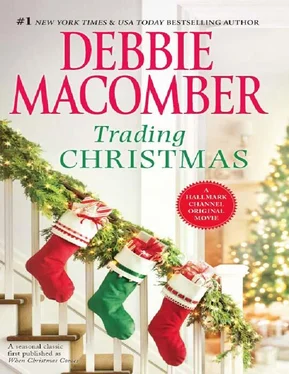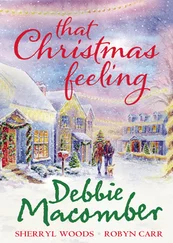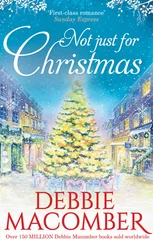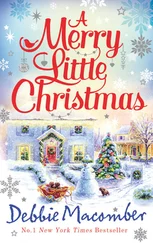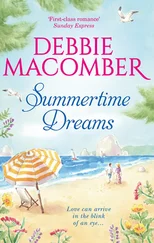“I’ll join when you do,” Emily returned.
“Might I remind you that I no longer live in Leavenworth?”
“Fine, join one in Oakland.”
“That’s not the point, Em,” her friend said. “You’ve been so wrapped up in Heather that you don’t have enough going on in your life.”
“You know that’s not true!” Emily could see that talking to Faith wasn’t having the desired effect. “I called because I need sympathy,” Emily said, her tone a bit petulant even to her own ears.
Faith laughed softly. “I’ve failed you, then.”
“Yes.” Emily figured she might as well tell the truth. “Of all people, I thought you’d understand.”
“I’m sorry to disappoint you, Em.”
Her friend didn’t sound sorry.
“I actually think being apart over the holidays might be good for you—and for Heather.”
Emily was aghast that Faith would suggest such a thing. “How can you say that?”
“Heather might appreciate you more and you might just discover that there are other possibilities at Christmas than spending it with your daughter.”
Emily knew she’d adjust much more easily if she wasn’t a widow. Being alone at this time of year was hard, had been hard ever since Peter’s death. Perhaps Faith was right. Perhaps she’d clung to her daughter emotionally, but Emily felt that in her circumstances, it was forgivable.
“I’ll be fine,” she managed, but she didn’t believe it for a moment.
“I know you will,” Faith said.
Even more distressed than before, Emily finished the conversation and hung up the phone. Never having had children, Faith didn’t understand how devastating Heather’s news had been. And if Emily was guilty of relying on her daughter too much, Christmas was hardly the time of year to deal with it. But wait a minute. She’d encouraged Heather’s independence, hadn’t she? After all, the girl was attending school clear across the country. Surely a few days at Christmas wasn’t too much to ask.
Emily decided a walk would help her sort through these complicated emotions. She put on her heavy wool coat, laced up her boots and wrapped her hand-knitted red scarf around her neck. She’d knitted an identical scarf for her daughter, although Heather’s was purple instead of red, and mailed it off before Thanksgiving. Finally she thrust her hands into warm mittens. It’d snowed overnight and the wind was cold enough to cut to the bone.
The Kennedy kids—ranging from six years old to thirteen—had their sleds out and were racing down the hill in the park. In order of age and size, they scrambled up the steep incline, dragging their sleds behind them. When they reached the top, they all waved excitedly at Emily. Sarah, the youngest, ran over to join her.
“Hello, Mrs. Springer.” Sarah smiled up at her with two bottom teeth missing.
“Sarah,” Emily said, feigning shock. “Did you lose those two teeth?”
The girl nodded proudly. “My mom pulled them out and I didn’t even cry.”
“Did the tooth fairy visit?”
“Yes,” Sarah told her. “James said there wasn’t any such thing, but I put my teeth under my pillow and in the morning there was fifty cents. Mom said if I wanted to believe in the tooth fairy, I could. So I believed and I got two quarters.”
“Good for you.”
With all the wisdom of her six years, Sarah nodded. “You’ve got to believe.”
“Right,” Emily agreed.
“In Santa, too!”
As the youngest, Sarah had four older brothers and a sister all too eager to inform her that Santa Claus and his helpers bore a strong resemblance to Mom and Dad.
“Do you believe, Mrs. Springer?”
Right now that was a difficult question. Emily was no longer sure. She wanted to believe in the power of love and family, but her daughter’s phone call had forced her to question that. At least a little…
“Do you?” Sarah repeated, staring intently up at Emily.
“Ah…” Then it hit her. She suddenly saw what should’ve been obvious from the moment she answered the phone that afternoon. “Yes, Sarah,” she said, bending down to hug her former kindergarten student.
It was as simple as talking to a child. Sarah understood; sometimes Emily hadn’t. You’ve got to believe. There was always a way, and in this instance it was for Emily to book a flight to Boston. If Heather couldn’t join her for Christmas, then she’d go to Heather.
The fact that this answer now seemed so effortless unnerved her. The solution had been there from the first, but she’d been so caught up in her sense of loss she’d been blind to it.
Emily had the money for airfare. All she needed was to find a place to stay. Heather would be so surprised, she thought happily. In that instant Emily decided not to tell her, but to make it a genuine surprise—a Christmas gift.
Emily reversed her earlier conviction. What could’ve been the worst Christmas of her life was destined to be the best!
Two
Charles Brewster, professor of history at Harvard, pinched the bridge of his nose as he stared at the computer. His eyes trailed to the clock in the corner of the screen to discover that it was three o’clock. Charles had to stop and calculate whether that was three in the afternoon or three at night. He often lost track of time, especially since he had an inner office without windows.
And especially since it was December. He hated the whole miserable month—the short days with darkness falling early, the snow, the distractedness of his students and colleagues. Christmas. He dreaded it each and every year. Cringed at the very mention of the holidays. Rationally he knew it was because of Monica, who’d chosen Christmas Eve to break off their relationship. She claimed he was distant and inattentive, calling him the perfect example of the absentminded professor. Charles admitted she was probably right, but he’d loved her and been shocked when she’d walked out on him.
Frowning now, Charles realized it was happening already. Christmas was coming, and once again he’d be forced to confront the memories and the bitterness. The truth was, he rarely thought of Monica anymore except at Christmas. He couldn’t help it. Boston during December depressed him. In fact, he associated Christmas, especially Christmas in the city, with unhappiness and rejection. It was as if those emotions had detached themselves from Monica and just become part of the season itself.
Standing up, he strolled out of his office and noticed that all the other History Department offices were dark and empty. It must be three at night, then, which meant he hadn’t eaten dinner yet. Funny, he distinctly remembered Mrs. Lewis bringing him a tuna sandwich and a cup of hot coffee. His assistant was thoughtful that way. On the other hand, that might’ve been the day before. Frankly, Charles no longer remembered. His stomach growled, and he rummaged through his desk drawers for a snack. He located a candy bar, eating it hungrily, with only the briefest consideration of how old it might be.
It was too late to head home now, Charles decided. If he left the building, Security would be on him so fast he wouldn’t make it to the front door. He’d have to haul out all his identification and explain why he was still here and… No, it was easier just to stay.
He returned his attention to his work. He’d recently been contracted to write a textbook. He’d agreed to a tight deadline because he knew it would help him get through the holidays. Now he wondered if he’d taken on too much.
The next time he glanced up from the computer, Mrs. Lewis had stepped into the office. “Professor Brewster, were you here all night?”
Charles leaned back in his chair and rubbed his hand along his face. “It seems I was.”
Shaking her head, she placed a cup of hot, black coffee on his desk.
Читать дальше
